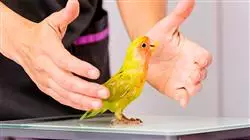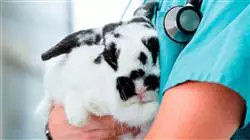University certificate
The world's largest faculty of veterinary medicine”
Introduction to the Program
New Companion Animals and Birds require specialized veterinarians. A profession increasingly in demand by owners"

The Postgraduate diploma in NNew Companion Animals and Birds is a high quality training program that focuses on the study of the main pathologies, diagnostic techniques and treatments in this type of animals, with special emphasis on ferrets and birds.
The demand for veterinary specialists is a direct consequence of the introduction of increasingly less common species into our homes, as well as a change in society's mentality towards some less novel species, which for years have been somewhat despised. Even today, there are still patients whose owners admit that this is the first time they bring the animal to the clinic, so it is necessary to contribute to eradicate this belief.
However, each animal has its own particularities. Ferrets are very active animals, independent, very funny, real explorers..., but they require a very attentive care to avoid accidents. They are very good pets, but they must be gradually accustomed to be handled to avoid bites. This Postgraduate diploma establishes the necessary management guidelines for its handling during consultation, hospitalization and complementary tests.
During the course of the Postgraduate diploma, updated guidelines for ferret maintenance and diet, essential for proper development, are established. Ferrets are strict carnivores and have ideal nutritional requirements for them, even in special situations, a basic and important aspect to avoid intestinal inflammations that, in the medium term, can lead to intolerances and unspecific diarrhea. In addition, they are very prone to develop tumors, so any mass or abnormality that is appreciated should be checked in the clinic by a specialist. They are also susceptible to human influenza, which happens to be a serious respiratory disease in the ferret.
Squirrels, hedgehogs or pet pigs (of the Vietnamese or Kune breed) have gained a place in some homes, but it is necessary to know their characteristics and particularities in order to treat them safely and effectively.
Another essential part of this Postgraduate diploma is related to wild or farmed birds. The veterinary professional must face these cases in the daily clinical practice, so it is necessary to understand the anatomical, physiological and ethological differences between conventional pets in the home and between avian species in order to approach the patient correctly.
Do not miss the opportunity to do this Postgraduate diploma in New Companion Animals and Birds with us. It's the perfect opportunity to advance your career"
The Postgraduate diploma in New Companion Animals and Birds contains the scientific most complete and up-to-date educational program on the market. The most important features of the program include:
- The development of case studies presented by experts in new companion animals and birds
- The graphic, schematic, and eminently practical contents with which they are created provide scientific and practical information on the disciplines that are essential for professional practice
- The latest news on the diagnosis and treatment of diseases in new companion animals and birds
- Practical exercises where the self-assessment process can be carried out to improve learning
- A special emphasis on innovative methodologies in the field of the diagnosis and treatment of diseases in new companion animals and birds
- Theoretical lessons, questions to the expert, debate forums on controversial topics, and individual reflection assignments
- Content that is accessible from any fixed or portable device with an Internet connection
This Postgraduate diploma is the best investment you can make in selecting a refresher program to update your knowledge in TECH”
Its teaching staff includes professionals from the veterinary field, who bring the experience of their work to this training, as well as recognised specialists from leading societies and prestigious universities.
The multimedia content, developed with the latest educational technology, will provide the professional with situated and contextual learning, i.e., a simulated environment that will provide immersive training programmed to train in real situations.
This program is designed around Problem Based Learning, whereby the specialist must try to solve the different professional practice situations that arise during the academic year. For this purpose, the professional will be assisted by an innovative interactive video system created by renowned and experienced experts in nNew Companion Animals and Birds.
This training comes with the best didactic material, providing you with a contextual approach that will facilitate your learning"

This 100% online Postgraduate diploma will allow you to combine your studies with your professional work while increasing your knowledge in this field"
Why study at TECH?
TECH is the world’s largest online university. With an impressive catalog of more than 14,000 university programs available in 11 languages, it is positioned as a leader in employability, with a 99% job placement rate. In addition, it relies on an enormous faculty of more than 6,000 professors of the highest international renown.

Study at the world's largest online university and guarantee your professional success. The future starts at TECH”
The world’s best online university according to FORBES
The prestigious Forbes magazine, specialized in business and finance, has highlighted TECH as “the world's best online university” This is what they have recently stated in an article in their digital edition in which they echo the success story of this institution, “thanks to the academic offer it provides, the selection of its teaching staff, and an innovative learning method aimed at educating the professionals of the future”
A revolutionary study method, a cutting-edge faculty and a practical focus: the key to TECH's success.
The most complete study plans on the university scene
TECH offers the most complete study plans on the university scene, with syllabuses that cover fundamental concepts and, at the same time, the main scientific advances in their specific scientific areas. In addition, these programs are continuously being updated to guarantee students the academic vanguard and the most in-demand professional skills. In this way, the university's qualifications provide its graduates with a significant advantage to propel their careers to success.
TECH offers the most comprehensive and intensive study plans on the current university scene.
A world-class teaching staff
TECH's teaching staff is made up of more than 6,000 professors with the highest international recognition. Professors, researchers and top executives of multinational companies, including Isaiah Covington, performance coach of the Boston Celtics; Magda Romanska, principal investigator at Harvard MetaLAB; Ignacio Wistumba, chairman of the department of translational molecular pathology at MD Anderson Cancer Center; and D.W. Pine, creative director of TIME magazine, among others.
Internationally renowned experts, specialized in different branches of Health, Technology, Communication and Business, form part of the TECH faculty.
A unique learning method
TECH is the first university to use Relearning in all its programs. It is the best online learning methodology, accredited with international teaching quality certifications, provided by prestigious educational agencies. In addition, this disruptive educational model is complemented with the “Case Method”, thereby setting up a unique online teaching strategy. Innovative teaching resources are also implemented, including detailed videos, infographics and interactive summaries.
TECH combines Relearning and the Case Method in all its university programs to guarantee excellent theoretical and practical learning, studying whenever and wherever you want.
The world's largest online university
TECH is the world’s largest online university. We are the largest educational institution, with the best and widest online educational catalog, one hundred percent online and covering the vast majority of areas of knowledge. We offer a large selection of our own degrees and accredited online undergraduate and postgraduate degrees. In total, more than 14,000 university degrees, in eleven different languages, make us the largest educational largest in the world.
TECH has the world's most extensive catalog of academic and official programs, available in more than 11 languages.
Google Premier Partner
The American technology giant has awarded TECH the Google Google Premier Partner badge. This award, which is only available to 3% of the world's companies, highlights the efficient, flexible and tailored experience that this university provides to students. The recognition as a Google Premier Partner not only accredits the maximum rigor, performance and investment in TECH's digital infrastructures, but also places this university as one of the world's leading technology companies.
Google has positioned TECH in the top 3% of the world's most important technology companies by awarding it its Google Premier Partner badge.
The official online university of the NBA
TECH is the official online university of the NBA. Thanks to our agreement with the biggest league in basketball, we offer our students exclusive university programs, as well as a wide variety of educational resources focused on the business of the league and other areas of the sports industry. Each program is made up of a uniquely designed syllabus and features exceptional guest hosts: professionals with a distinguished sports background who will offer their expertise on the most relevant topics.
TECH has been selected by the NBA, the world's top basketball league, as its official online university.
The top-rated university by its students
Students have positioned TECH as the world's top-rated university on the main review websites, with a highest rating of 4.9 out of 5, obtained from more than 1,000 reviews. These results consolidate TECH as the benchmark university institution at an international level, reflecting the excellence and positive impact of its educational model.” reflecting the excellence and positive impact of its educational model.”
TECH is the world’s top-rated university by its students.
Leaders in employability
TECH has managed to become the leading university in employability. 99% of its students obtain jobs in the academic field they have studied, within one year of completing any of the university's programs. A similar number achieve immediate career enhancement. All this thanks to a study methodology that bases its effectiveness on the acquisition of practical skills, which are absolutely necessary for professional development.
99% of TECH graduates find a job within a year of completing their studies.
Postgraduate Diploma in New Companion Animals and Birds
.
In a world where pets have become a fundamental part of our lives, the need arises to expand our knowledge in the care of non-conventional animals. At TECH Global University we present our Postgraduate Diploma program in New Companion Animals and Birds, designed to provide you with the necessary skills to become an expert in the care and management of these unique pets. Our virtual classes offer you the convenience of studying from anywhere and tailoring your learning at your own pace. With the flexibility of accessing online content, you will be able to organize your study schedule according to your needs. In addition, you will be supported by experts in the field of NACs and birds throughout the program. In this specialized postgraduate program, you will explore the specific characteristics and needs of new companion animals, such as reptiles, rodents, amphibians and birds. You will learn about their feeding, habitat, behavior, health and welfare, as well as proper handling and training techniques. You will gain up-to-date knowledge on the latest research in the field and best practices in the care of these unique pets.
You will learn about the latest research in the field and best practices in the care of these unique pets.
Become an expert in the care and handling of unique pets
.
Our veterinary faculty is comprised of leading professionals in the field of NACs and birds. Through practical case studies, case studies and interactive activities, you will develop the skills necessary to provide optimal care for these pets and provide expert advice to their owners. From proper species selection to disease prevention and management, this program will provide you with the necessary tools to become a reference in the care of new pets and birds. Take this opportunity to excel in your career and make a difference in the field of unique pet care. Join TECH Global University and discover how to turn your passion for animals into a rewarding profession!







